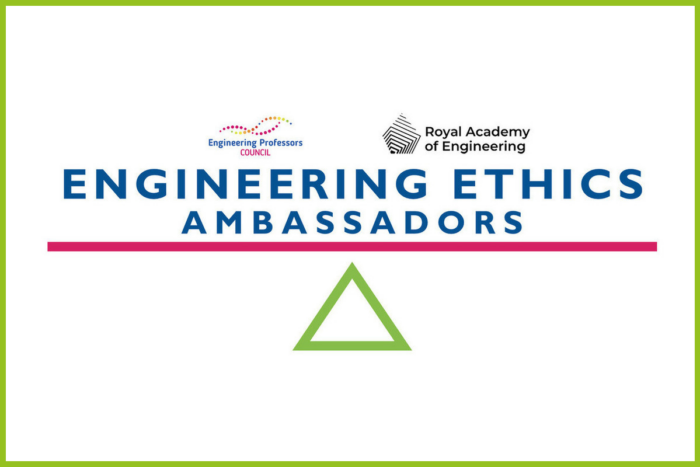Ethics Ambassadors
“When I started to teach ethics, many years ago now, I felt alone… today we are a community who help and support each other. Together we can make ethics in engineering the core of the way we teach and practice engineering. This is why I would like to invite you to join such a vibrant and inclusive community.”
– Raffaella Ocone, Chair of the Engineering Ethics Advisory Group

The Ethics Ambassadors community was created in March 2023, to expand and develop the work and recommendations of the Engineering Ethics Advisory Group, on their completion of Phase 2 of the Engineering Ethics Toolkit.
The goal is for Ethics Ambassadors to evolve into a self-managed community of volunteers who will promote the use of the Ethics Toolkit within their own institutions or workplaces.
The aims of the community are:
- to champion the teaching of ethics within engineering courses and modules;
- to support educators integrating ethics teaching within engineering courses and modules;
- to share best practice in engineering ethics teaching;
- to identify and address needs within engineering ethics teaching;
- to source, review, develop and publish new materials for the Engineering Ethics Toolkit.
Contributions
We welcome new content for the Engineering Ethics Toolkit and encourage you to pitch ideas or submit materials. You can find out more on our Get Involved page.
We are specifically looking for the following content.
Case studies on:
- Design / disposal of medical waste such as home Covid tests or masks, pill packaging, etc;
- Genetically engineering mosquitoes or other animals to reduce or eliminate their reproduction;
- Implantation of devices that control human health or biology, such as sleep/wake cycles, etc. (or another transhumanist topic);
- Balancing human safety in public spaces at night with dark sky or animal health initiatives;
- Transport issues (infrastructure, access, safety, etc.);
- Artisanal or deep-sea mining and the connection to indigenous rights;
- Equity and impact of flood or erosion mitigation solutions.
Enhancements on the following case studies:
- Choosing a career in climate change geoengineering. Enhancement desired: Activity: map the arguments of the three professors. Whose perspective might be the most persuasive and why?
- Smart homes for older people with disabilities. Enhancement desired: Create a sample data set for technical analysis.
- Solar panels in a desert oil field. Enhancement desired: Produce example calculations in chemical and/or electrical engineering related to carbon offset and solar installations.
Guidance articles on:
- How ethics links to other competencies and skills
- Getting comfortable with open-ended problems/questions related to ethics
- Learning taxonomies and ethics education
To join Ethics Ambassadors, please fill out this Membership request form.
To be added to the LinkedIn group, first fill out the membership request form and then send us a request via the group link.
We are seeking academics and other engineering professionals to review the various case studies, enhancements, guidance articles and other resources that are submitted to us for publication within the Engineering Ethics Toolkit.
What you can expect as an Engineering Ethics Toolkit content reviewer:
-
- That we will treat you as the professional and subject matter expert that you are.
- That we will not ask you to review an unreasonable amount of content (our expectation is that this will not exceed two or three pieces of content per year).
<li>That we will be clear about your assignments and deadlines.
- That, once you have completed your first review assignment, we will recognise your academic citizenship by adding your bio and photo to our Contributors page.
What we expect from you:
- That you will act professionally within this role and bring your expertise to the table when reviewing content.
- That you will follow the applicable reviewer guidance document(s).
- That you will ask us for support if you feel that the content of the review assignment exceeds your expertise.
- That you will abide by any applicable rules, regulations or laws, including those regarding privacy and data protection.
- That you will maintain confidentiality about the content of the review assignment until it is published.
- That you will work to agreed deadlines once you have accepted a review assignment.
You can read our current Guidance for Reviewers document here.
To become a volunteer reviewer for the Engineering Ethics Toolkit, please complete this application form.
To discuss matters relating to Ethics Ambassadors please email Rhian Todd r.todd@epc.ac.uk